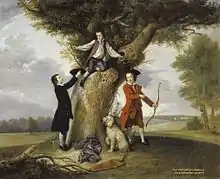Frederick Stuart (British politician)
Frederick Stuart (24 September 1751 – 17 May 1802) was a British East India Company employee and politician.

Frederick Stuart | |
|---|---|
| Personal details | |
| Born | 24 September 1751 |
| Died | 17 May 1802 (aged 50) London, United Kingdom |
| Nationality | British |
| Parent(s) | John Stuart, 3rd Earl of Bute and Mary Wortley Montagu |
| Occupation | East India Company employee; politician |
He was born on 24 September 1751, the third son of John Stuart, 3rd Earl of Bute, and his wife Mary Wortley Montagu.[1] Lord Bute was to become Prime Minister of Great Britain (1762–63) under George III. Frederick's siblings included: John, a politician; James and Charles, soldiers and politicians; William, an Anglican bishop; and Louisa, a writer. He studied at Winchester College and Christ Church, Oxford, before running away briefly to Paris.[2] Described as the "black sheep of the family",[2][3] his father obtained a writership for him at the East India Company in 1769, which was unusual for a family with such as position in society.[3] He worked in Bengal and befriended Warren Hastings, who gave him a mission to the Nawab of Arcot.[2]
After returning from India in 1775, Stuart entered parliament, representing the family interest of Ayr Burghs following a by-election in 1776. No seat was found for him in 1780; indebted, he fled to Paris in 1782.[2] His brother, John, 1st Marquess of Bute, provided refuge and returned him to parliament in 1796 to represent the family interest of Buteshire.[1] There is no evidence of parliamentary activity and he died, unmarried, on 17 May 1802 in London.[1]
References
- Henry, D. G. "Stuart, Hon. Frederick (1751–1802), of Kirktown, Cumbrae, Bute". The History of Parliament. Retrieved 4 October 2014.
- Sutherland, Lucy S. "Stuart, Hon. Frederick (1751–1802)". The History of Parliament. Retrieved 4 October 2014.
- McGilvary, George (2008). East India Patronage and the British State: The Scottish Elite and Politics in the Eighteenth Century. I.B.Tauris. p. 132. ISBN 9780857712288.